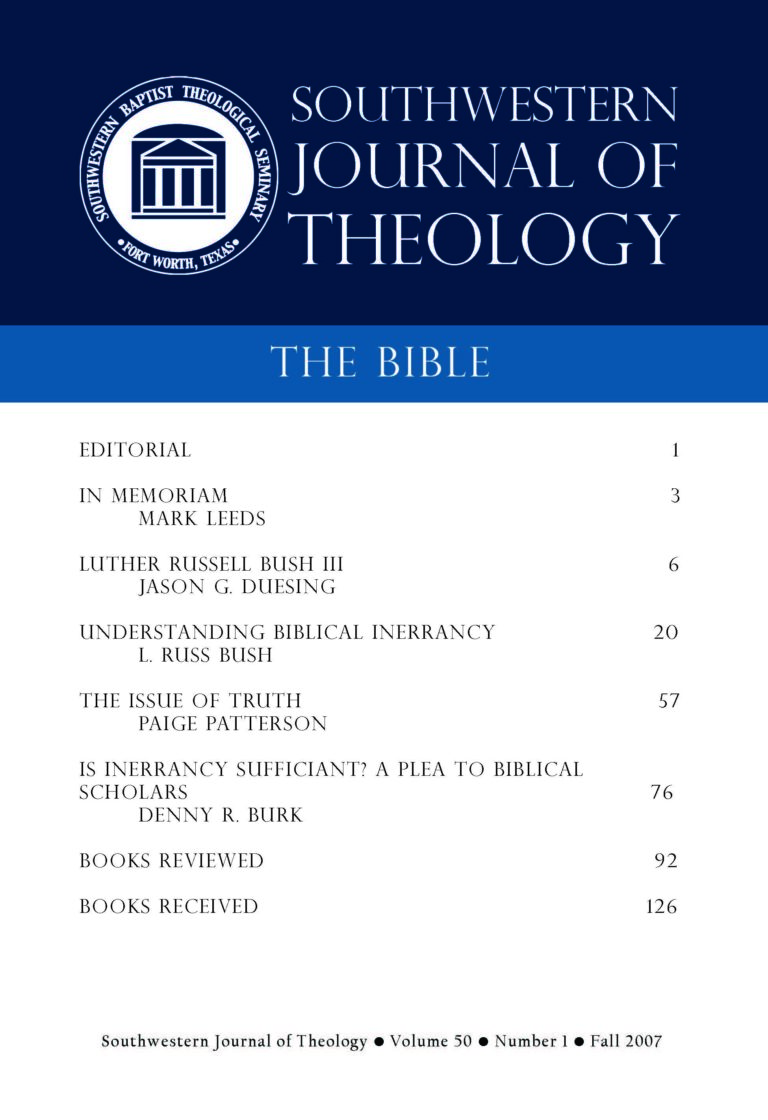
The Bible
Southwestern Journal of Theology
Volume 50, No. 1 – Fall 2007
Managing Editor: Malcolm B. Yarnell III
By Iain Provan, V. Phillips Long, and Tremper Longman III. Louisville: Westminster John Knox Press, 2003. 426 + xiv pages. Softcover, $34.95.
Very little will distinguish one Bible-based history of Israel from another unless that history courageously addresses the current scholarly debate that could potentially place the validity of its own existence into question. This history accepts that challenge. Israel’s ancient past (alleged past for many contemporary scholars) comprises the second of two parts or, roughly, two-thirds of the book. Part one addresses the question, “Can a history of Israel, strongly relying on the Bible, be formed so as to be considered viable by the larger scholarly community?” Though this book cannot be considered the final answer in what has become an intricate philosophical debate, it does provide tangible weight to maximalist arguments, thus keeping the skeptics honest.
Part one outweighs the rest of the book in importance because of the necessity of establishing the relevance of any history of Israel. A history of Israel does not stand on its own merit anymore. Instead, in light of current debates on the historicity of the primary sources, a comprehensive apology must be offered as well. The first five chapters concisely address the concerns of the authors about attempting such a history in light of K.W. Whitelam’s demand that it is “time [to] formally reject the agenda and constraints of ‘biblical history’” (3).
Each contributor brings to the discussion a background in Old Testament studies that reflects his interest in the debate. From their studies on ancient Israelite historiography and their collected commentaries on narrative texts from the Ancient Near East, each contributes substantive experience as historian, professor, researcher, and author.
The introduction by the authors reveals the scope of the book at the conclusion to part one (chap. 5). It is an honest appraisal of the perspective of the book. These are Old Testament scholars who happen to be historians as well. They regard the Bible to be Scripture as well as a source for historical data and, therefore, recognize that theological convictions will arise in their writing.
Though the biblical texts are rightfully considered to be primary sources, other secondary sources are given considerable (in some cases, equal) weight in relevance. These include non-biblical literary sources, non-literary archaeological sources and, to a lesser degree, anthropological and sociological considerations.
In part two, Provan et al purposefully link their history of Israel to the apologetics in the first half by structuring that history around the evidence that supports it. Chapters one through three paint a recent history of historiographical scholarship that includes input from scholars such as Whitelam, J.A. Scoggin and works by J.M. Miller and J. Hayes. In chapter four, Long addresses the issue of assessing historic value based on literary genre by presenting narrative forms as a useful and necessary vessel for history.
Chapter six recalls the patriarchal period and candidly admits that the sole source is Genesis. Chapter seven recounts the various scholarly models for Canaanite settlement and cites extra-biblical sources: the Merneptah Stela and the Amarna Letters. Chapter eight’s history explores the plausibility of an historical David. Chapters nine through eleven include mention of archaeological finds and additional literary sources that aid in the understanding of the later monarchy and the era of the divided kingdoms.
This book answers with a resounding no! the charge of the historical minimalists who insist that a proper history of Israel is impossible to attain due to lack of evidence. The authors argue logically that no historian worth his salt would throw out a primary source (and, in some cases the only source) due to some perceived, albeit minor, inconsistencies—a sacrifice that would leave him with virtually nothing. Instead, he would embrace it warmly as he would any source. It would only be questioned when challenged by other, more significantly reliable, sources. Instead of questioning the biblical record out-of-hand, Provan et al have demonstrated the rationale for up-front acceptance of biblical texts for understanding Israel’s history.





